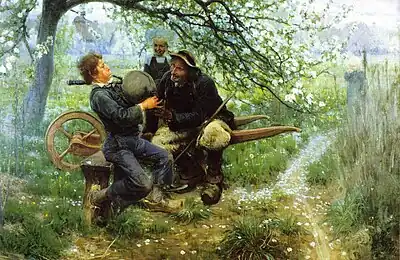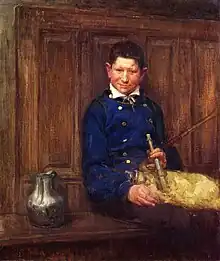The Bagpipe Lesson
The Bagpipe Lesson is a painting by Henry Ossawa Tanner, completed in late 1893 and displayed at the World's Columbian Exposition (May — October 1893) and at the Pennsylvania Academy of the Fine Arts 63rd annual exhibition, held from December 18, 1893 to February 24, 1894.[2][3] The painting was begun by Tanner during his first summer in France, during a trip to Brittany.[1] He finished the work in Philadelphia.[1]
| The Bagpipe Lesson | |
|---|---|
 | |
| Artist | Henry Ossawa Tanner |
| Completion date | 1893 |
| Medium | oil |
| Movement | French Academic art |
| Subject | boy learning bagpipe with father |
| Location | Hampton University Museum, Hampton, Virginia, USA |
The picture shows a father teaching his son to play the bagpipe, and the intensity of the man with the "spasmodic efforts" of his son brings humor to the work.[1] In parts of America, this was more widely popular in the 1890s than was The Banjo Lesson, due to sensitivity over racial relations.[4]
Reaction
Academy
The painting made an impression at the exhibition, enough that it was one of three images from the 63rd Academy printed in the Philadelphia Inquirer.[5] It was also one of the 40 images chosen to be engraved for the event's catalog.[6] It was one of three paintings of Tanner's to be talked about in the Philadelphia newspapers in 1894, the other two being The Thankful Poor and The Banjo Lesson.[7]
Paris Salon versus Cotton States International Exposition
It was also displayed at the 1895 Cotton States and International Exposition (September-December 1895) in Atlanta, where it won a medal.[8][4]
In the United States, The Bagpipe Lesson was the painting that "brought H. O. Tanner to the front as an artist."[8] The painting is an example of Tanner's skill painting in "French Academic Style."[9] It has been described as a work "typical" of that produced by American artists learning the French style.[9] However, it was important in that it was painted about the same time as The Banjo Lesson and The Thankful Poor, works in which Tanner made a "conceptual transformation" by applying it to African Americans.[9] Judges at the Paris Salon saw that transformation, allowing the Banjo Lesson to be his first Salon entry in the spring of 1894.
Reaction to Tanner's works may be based on place. At Paris, although not a popular painting, Tanner's The Banjo Lesson won admission into the Paris Salon and was displayed with all the other Salon-accepted paintings.[4] In the Atlanta Exposition, The Bagpipe Lesson which was "devoid of race" was the medal-winning artwork, while The Banjo Lesson was placed in a special "Negro building" where it would only be seen by those interested in African American art.[4]
 Study for The Bagpipe Lesson, 1892, Smithsonian American Art Museum
Study for The Bagpipe Lesson, 1892, Smithsonian American Art Museum The Bagpipe Player, c. 1895.
The Bagpipe Player, c. 1895.
References
- "Art Notes". The Philadelphia Inquirer. Philadelphia, Pennsylvania. 3 December 1893. p. 7.
Henry O. Tanner is at present busy on a picture intended for the December exhibition at the Academy. The picture was begun sometime ago in Brittany, and represents a father teaching his son to play a bagpipe. The picture is full of spirit, the intense interest of the old man in the boy's progress and the rather spasmodic efforts of the red-faced boy to fill the instrument with wind possessing a quiet humor that is bound to make the picture popular.
- Mosby, Dewey F. (1991). Henry Ossawa Tanner. Philadelphia Museum of Art. Philadelphia; New York: Philadelphia Museum of Art; Rizzoli International Publications. p. 39. ISBN 978-0-8478-1346-9.
- "1893-1894 Pennsylvania Academy of the Fine Arts Philadelphia PA "63rd annual exhibition" December 18 1893 – February 24 1894". Fine Art Database. 18 December 1893.
Exhibition name: 63rd annual exhibition; Exhibition host name & location: Pennsylvania Academy of the Fine Arts, Philadelphia, PA; Exhibition dates: December 18 1893 – February 24 1894; Exhibition additional location & dates (for travel exhibitions): [none]; Exhibition sponsor: Pennsylvania Academy of the Fine Arts
- Ervin Dyer (23 February 1997). "Portrait of a Painter". Pittsburgh Post-Gazette. Pittsburgh, Pennsylvania. p. 81.
- "The Academy Exhibit: Closing Weeks of the Finest Annual Display of Paintings Ever Held in This Country". The Philadelphia Inquirer. Philadelphia, Pennsylvania. Feb 4, 1894. p. 9.
- "Tanner's Picture Approved by the A.M.E. Ministerial Union". The Philadelphia Inquirer. Philadelphia, Pennsylvania. 29 May 1894. p. 5.
- "Art Notes". The Philadelphia Inquirer. Philadelphia, Pennsylvania. 29 April 1894. p. 11.
- "Matters of interest among the colored people". The Atlanta Constitution. Atlanta, Georgia. 10 November 1895. p. 18.
- "Studied Realism". The Philadelphia Inquirer. Philadelphia, Pennsylvania. 27 January 1991. p. 102.